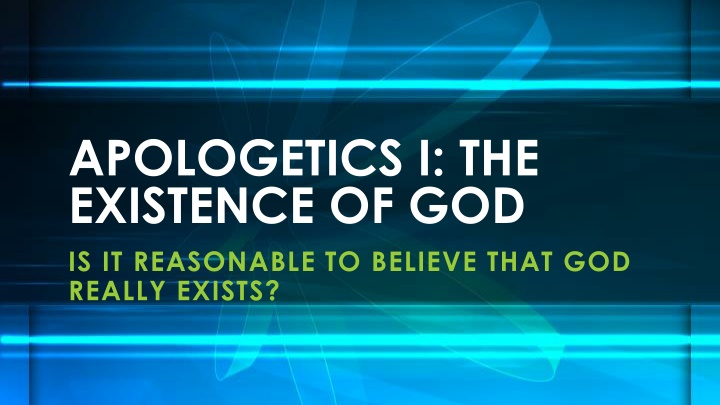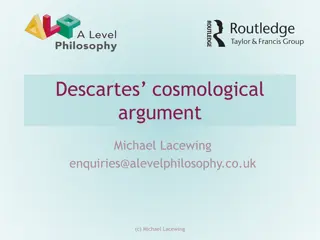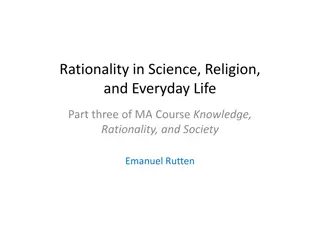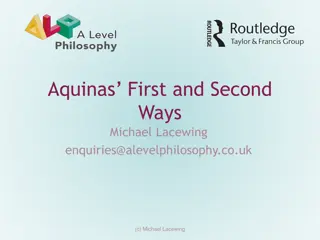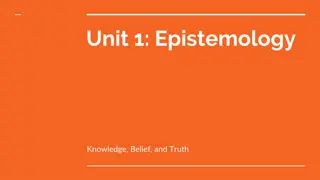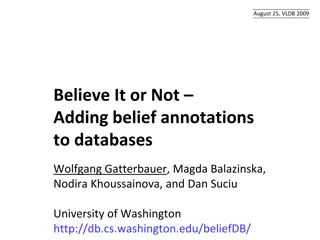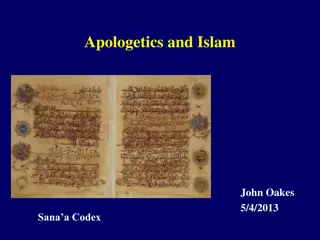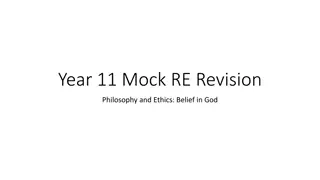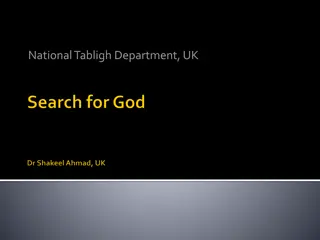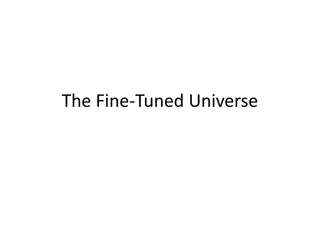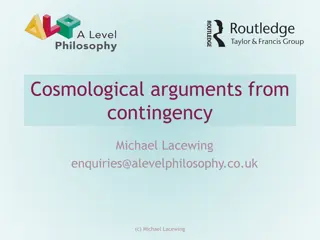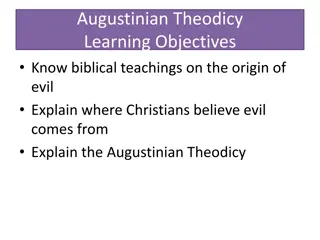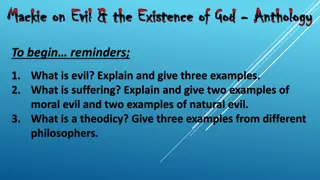The Reasonable Belief in the Existence of God – Apologetics Explained
Apologetics delves into logically defending the existence of God against critics. It explores various methods of proving God's existence, including science, philosophy, personal experience, and legal/historical approaches. The concept of defining God as supernatural, intelligent, personal, and purposeful is explored, along with common positions on the existence of God ranging from atheism to theism. The importance of faith in believing in God is emphasized in understanding the consequences of a world without God.
Uploaded on Sep 28, 2024 | 5 Views
Download Presentation

Please find below an Image/Link to download the presentation.
The content on the website is provided AS IS for your information and personal use only. It may not be sold, licensed, or shared on other websites without obtaining consent from the author.If you encounter any issues during the download, it is possible that the publisher has removed the file from their server.
You are allowed to download the files provided on this website for personal or commercial use, subject to the condition that they are used lawfully. All files are the property of their respective owners.
The content on the website is provided AS IS for your information and personal use only. It may not be sold, licensed, or shared on other websites without obtaining consent from the author.
E N D
Presentation Transcript
APOLOGETICS I: THE EXISTENCE OF GOD IS IT REASONABLE TO BELIEVE THAT GOD REALLY EXISTS?
What is apologetics? The term Apologetics comes from the Greek word, (apologia). This is not like the English word, apology that has taken the meaning to say you are sorry . Instead, apologia means to give a verbal (or written) defense . This could be something as simple as explaining something or as formal as a legal defense in a law court. In the Bible, it is used when speaking of logically defending the message of the gospel against critics or of systematically explaining it to unbelievers who do not understand it. I Peter 3:15 says But in your hearts set apart Christ as Lord. Always be prepared to give an answer (apologia) to everyone who asks you to give the reason for the hope that you have. But do this with gentleness and respect. Paul had to defend himself in Roman court by defending the gospel (Acts 22: 1-21; 2Tim. 4:16). In doing so, he influenced the leaders of his day like King Agrippa (Acts 26:1-28) and testified to all those who came to observe the court proceedings.
Is it possible to prove the existence of God? How do we prove something? Science- only applies to the physical universe; indirect evidence Legal/ Historical approach- testimony from eye-witnesses; depends on the credibility and number of the witnesses Philosophy- reason and logic; Four big questions of life- 1. Where do I come from? 2. Who am I? 3. What is the meaning and purpose of life? 4. Where am I going? Personal experience- powerful, valid but subjective
How do we define God? Supernatural- beyond the physical universe; not restricted by time, space or physical limitations Intelligent- a master of design and planning Personal- not merely a force, has a definite character Purposeful- has a purpose for the universe and us
Common Positions on the Existence of God Atheism- No God, gods or supernatural; naturalism, materialism Agnosticism- impossible to know about God; don t know, don t care Pantheism/ Panentheism- God is everything and in everything; Physical world is an illusion; only the eternal Spiritual world is real. Polytheism/ Animism- Many gods or powerful spirits in nature. Most of these systems still presume an ultimate Creator. Deism- God created everything and set natural laws but left us to our own devices. Theism/ Monotheism- one ultimate eternal creator God
Does God exist? And without faith it is impossible to please God, because anyone who comes to him must believe that He exists and that he rewards those who earnestly seek him . Heb. 11:6 What if God did not exist? There are three inescapable consequences of this: There would be no ultimate meaning in life or for existence. There would be no ultimate value in life. No good or bad, right or wrong. There would be no ultimate purpose. There would be no free will. Life without God would be absurd. No one can live their life by the principles above. There are two necessary things in Christianity to provide ultimate meaning: God and eternal life.
Arguments from Logic Philosophy- the search for truth through logical reasoning. It can only make sense if God exists. Ontology is the study of existence; Who am I? Anselm s Ontological Argument
What is the universe? Views about the nature of the universe and its origin (Cosmology) The universe is eternal (and therefore, god) -no beginning or end The universe is an illusion The universe came from nothing in a Big Bang and will collapse The universe is part of a multi-verse and was produced by forces from other universes The universe was created from nothing by God who exists beyond the physical universe
If the universe exists, then God must exist The Leibniz Cosmological Argument (cosmology is the study of the origin of the universe; where do we come from?) Asks and answers the question: Why is there something rather than nothing? Everything has an explanation of its existence. Either the necessity of its own nature (example- math) or an external cause. If the universe has an explanation of its existence* then it must be God (a non- material mind with the power to create and the intellect to design). The Universe exists. Therefore, the universe has an explanation and that explanation is God. God is a self-explanatory being. *The universe does not exist by the necessity of its nature, so it must have an external cause.
If the universe exists, then God must exist The Kalam Cosmological Argument This argument was first made by a Muslim philosopher. It is a logical argument and must be true unless one of the statements is false. 1. Whatever begins to exists must have a cause. 2. The universe began to exist (In this respect we agree with the scientific community. We do not believe in the Big Bang theory but we believe in a beginning- genesis) 3. Therefore, the universe has a cause. 4. That cause must be God- the Uncaused Cause .
Main Ideas from the Logical proofs 1. It is logically coherent to propose that God, a Maximally Great Being, exists because such a being would be necessary to all other existence. The necessity of God can also be found in the cosmological arguments. The burden of proof shifts to the atheist to prove that it is impossible for such a being to exist. 2. The universe began to exist and that means that it requires an explanation and an ultimate cause. To suggest otherwise is logically incoherent. Both of the explanation and the cause must come from outside the physical universe (matter, energy, space and time) and be non-contingent (not arising from any other cause). This explanation/cause must be intelligent and purposeful. 3. The person that says there is no God must come up with a logically coherent alternative. They must prove that the existence of God is not possible or necessary and that the universe has another cause.
The heavens declare the glory The heavens declare the glory of God and the skies proclaim of God and the skies proclaim the work of His hands. the work of His hands. Psalm 19:1 Psalm 19:1
The Fine Tuning Argument 1. The Fine Tuning of the Universe is either the result of necessity, chance or design. 2. The Fine Tuning of the Universe is not the result of necessity or chance. 3. The Fine Tuning of the Universe is the result of design. 4. Design requires the existence of a personal, powerful and intelligent Designer that we call God.
Arguments from Design The Goldilocks Zone- The conditions necessary to make the Earth habitable for life. The number of conditions is in the hundreds and growing with new scientific discoveries.
The Goldilocks Zone- Conditions for life on Earth There are hundreds of physical parameters that are necessary for life: 1. The position of our solar system in the Milky Way galaxy- between spiral arms and on the galactic plane. Prevents us from being crushed by gravity or fried by radiation. Our position enables us to see the universe. 2. Earth s position in our solar system is essential for life. The four outer gas planets, Jupiter, Saturn, Uranus and Neptune, are perfectly placed to protect the Earth from comet and asteroid collisions and keep us in our proper orbit. Shoemaker-Levy comet 3. The moon provides the Earth with about 20 things necessary for life. Its distance and size are perfect to maintain a perfect orbit for us. It causes tides that clean our coast areas and distribute nutrients. It creates ocean currents which moderate our climate. 4. Earth s iron and molten core create a magnetosphere that protects us from solar radiation and protects our atmosphere.
The Goldilocks Zone- Continued 5. Earth s placement makes liquid water, carbon and oxygen possible. 6. The atmosphere makes photosynthesis possible. Nutrients dissolved by liquid water enable plants to make food and oxygen which are necessary for life. 2% closer or farther away would 7. Earth s 23.5 degree tilt makes the seasons possible which makes more of the planet s surface livable. 8. The size and colour of the Sun make it perfect for the energy we need while not too strong. 9. Earth s size creates the ideal gravity for life to exist and to maintain an atmosphere. 10. The Earth s 24 hour rotation maintains an average temperature necessary for life.
Arguments from Design Paley s Argument from Design If there is evidence of design in the universe, then there must be a Designer . Two powerful evidences of design are DNA and discoveries in Molecular biology That Designer must be infinitely intelligent and powerful. The Designer must be God.
The Moral Argument 1. If God does not exist, objective moral values do not exist 2. Objective moral values do exist. 3. Therefore, God exists.
